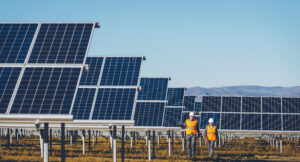By James Felton, Chief Operating Officer, White Oak Europe
Despite the Covid-19 pandemic, during 2020 the world’s renewable energy grew at its fastest pace in 20 years[1]. Delivery of solar power projects increased by 50% compared to 2019 as growth in demand for clean power from households, companies and governments accelerated.
Maintaining this momentum will be critical to meeting the Paris Agreement goals and halting the pace of climate change. In the coming energy transition, decarbonised power systems and increased use of electricity in buildings, industry and transport will have a key role to play.
While the financial markets are already directing capital away from fossil fuels and towards other energy technologies including renewables, the International Renewable Energy Agency (IRENA) estimates that global energy transition investment will have to increase by 30% over planned investment to a total of $131 trillion between now and 2050, corresponding to $4.4 trillion on average every year. SMEs in this sector have a vital role to play and it is critical that they receive the capital they need to enable growth for a better future.
In addition to helping to address climate changes, this investment is expected to deliver significant financial benefits. Recent studies show that the cost of renewables is set to continue to decline dramatically through to 2030, driven by technology improvements, economies of scale, competition, and growing experience. According to IRENA, the weighted average cost of electricity in the G20 countries from utility-scale solar photovoltaic could fall by up to 55% by 2030 from 2019 levels, and from concentrated solar power by 62%. This will place solar power among the lowest-cost options for new capacity in almost all parts of the world.
Furthermore, going solar can minimise electricity loss, deliver energy independence and enhance grid security. Given the increasingly limited resources of coal and natural gas and more frequent natural disasters, these factors are growing in importance for both consumers and governments.
Looking ahead, as the UK emerges from the Covid-19 pandemic, job creation will be at the heart of our economic recovery. As employers to three fifths of the UK workforce[2], SMEs will no doubt play a vital role in driving this process. However, for the Government to reach its net-zero carbon emissions target by 2050, a portion of jobs with a high carbon footprint will need to gradually disappear. This is where the growing renewable energy sector, including solar, can play a particularly important role, helping to not only address the employment crisis resulting from Covid-19 but also the pressing climate emergency.
According to IRENA, employment in renewable energy worldwide was estimated at 11.5 million in 2019, up from 11 million in 2018. The solar photovoltaic industry is responsible for the highest share of total renewable energy workforce at 33%.
In addition to generating additional jobs for skilled workers within their sectors, renewable energy technologies are expected to drive electrification of transport and industrials, thereby indirectly facilitating employment growth across multiple sectors of the UK economy.
Supporting the UK on this path to sustainable recovery means supporting SMEs across the renewable energy sector, ensuring they recover and grow to reach their full potential.
White Oak, an independent business lender to SMEs, prides itself on delivering flexible and efficient capital solutions through personalised service, and since 2018 has provided over £1 billion to businesses across the UK, including £400 million under the CBILS programme.
This has been invaluable to businesses such as the FDG Group, an award-winning, family-run renewable energy company based in Nottingham, which needed a source of finance to help them weather the worst of the crisis and reinforce their ability to thrive and expand.
Supporting sustainable SMEs means investing for the future, and White Oak is proud to support the UK’s solar energy sector.
[1] Source: International Energy Agency (IEA).
[2] Source: Department for Business, Innovation & Skills
Read more:
The role of solar in driving a sustainable recovery across the UK
















